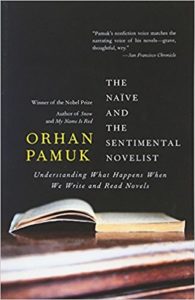If I had read The Naive and Sentimental Novelist before reading Orhan Pamuk’s novels, I probably would not have bothered with them. That would have been a pity because most of them are very good, and one, Snow, is among the best I have ever read. So there’s a considerable gap between this collection of six essays — delivered in 2009 as the Norton Lectures at Harvard University — that describe how he thinks about novel writing and the actual results. Pamuk certainly isn’t the first to be better at doing what he does than he is at explaining it.
I think there are several reasons the essays annoyed me so much, some of them relating to personal tics, at least one related to the process of making this book, and others relating to what Pamuk actually has to say. To take the middle first, Turkish has just one pronoun, “o,” for the third person singular. A person writing in Turkish, as Pamuk does, will not necessarily have to consider whether “he” or “she” is appropriate, whether a more clearly inclusive construction such as “he or she” is necessary, or whether to draw on the venerable but lately deprecated tradition of the singular “they.” Nor will such a writer consider taking the time to recast the sentence to avoid pronouns completely. Pamuk can use “o” any time he writes about a generic individual. His translator, however, has to figure out a way to address the issue in English. In this case, Pamuk’s translator has opted for the generic “he” throughout. I stumbled over that quite a bit, and if there’s one thing I feel strongly about in translation, it’s that you don’t want your readers stumbling over your part of the work. Authors can make silly arguments, sure (some of mine have), but you should not be adding barriers between your readers and the work.
Another problem I had with this work is also related to pronouns. It’s a bit of a personal tic, but it has grown to become one because I think it speaks to a deeper issue in essay writing. Pamuk, like many people writing about literature, uses “we” and “us” quite a bit. The authors show us this; we see that; we read; we feel; writers tell us the other. I doubt that there is a two-page spread in all of The Naive and Sentimental Novelist without at least one “we” or “us.” But in Tonto’s immortal words, “What ‘we’, white man?” Or less flippantly, who does Pamuk mean by “we” and “us”? Assumptions lurk in pronouns, and I do not think that Pamuk has examined his much in this regard. Who is he talking about? Who is he talking to? Greater care figuring this out and answering this question would have produced better essays.



